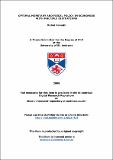Files in this item
Optimal monetary and fiscal policy in economies with multiple distortions
Item metadata
| dc.contributor.advisor | Nolan, Charles | |
| dc.contributor.author | Horvath, Michal | |
| dc.coverage.spatial | 258 | en |
| dc.date.accessioned | 2008-03-04T16:44:03Z | |
| dc.date.available | 2008-03-04T16:44:03Z | |
| dc.date.issued | 2008 | |
| dc.identifier | uk.bl.ethos.552082 | |
| dc.identifier.uri | https://hdl.handle.net/10023/438 | |
| dc.description.abstract | This thesis aims to contribute towards a better understanding of the optimal coordination of monetary and fiscal policy in complex economic environments. We analyze the characteristics of optimal dynamics in an economy in which neither prices nor wages adjust instantaneously and lump-sum taxes are unavailable as a source of government finance. We then propose that monetary and fiscal policy should be coordinated to satisfy a pair of simple `specific targeting rules', a rule for inflation and a rule for the growth of real wages. We show that such simple rule-based conduct of policy can do remarkably well in replicating the dynamics of the economy under optimal policy following a given shock. We study optimal policy coordination in the context of an economy where a constant proportion of agents lacks access to the asset market. We find that the optimal economy moves along an analogue of a conventional inflation-output variance frontier in response to a government spending shock, as the population share of non-Ricardian agents rises. The optimal output response rises, while inflation volatility subsides. There is little evidence that increased government spending would crowd in private consumption in the optimal economy. We investigate the optimal properties and wider implications of a macroeconomic policy framework aimed at meeting an unconditional debt target. We show that the best stationary policy in terms of an unconditional welfare measure is characterized by highly persistent debt dynamics, less history-dependence in the conduct of policy, less reliance on debt finance and more short-term volatility following a government spending shock compared with the non-stationary `timelessly optimal' plan. | en |
| dc.format.extent | 1615970 bytes | |
| dc.format.mimetype | application/pdf | |
| dc.language.iso | en | en |
| dc.publisher | University of St Andrews | |
| dc.subject | Optimal monetary and fiscal policy | en |
| dc.subject | Timeless perspective | en |
| dc.subject | Nominal rigidity | en |
| dc.subject | Non-Ricardian agents | en |
| dc.subject | Stationary policy | en |
| dc.subject | Unconditional debt targets | en |
| dc.subject.lcc | HG230.3H7 | |
| dc.subject.lcsh | Monetary policy--Econometric models | en |
| dc.subject.lcsh | Fiscal policy--Econometric models | en |
| dc.subject.lcsh | Mathematical optimization | en |
| dc.title | Optimal monetary and fiscal policy in economies with multiple distortions | en |
| dc.type | Thesis | en |
| dc.type.qualificationlevel | Doctoral | en |
| dc.type.qualificationname | PhD Doctor of Philosophy | en |
| dc.publisher.institution | The University of St Andrews | en |
This item appears in the following Collection(s)
Items in the St Andrews Research Repository are protected by copyright, with all rights reserved, unless otherwise indicated.

